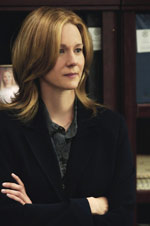Breach is the third spy film in only a few months to examine the personal costs required to work in the deceitful and dangerous world of espionage. In Casino Royale, The Good Shepherd and now this FBI thriller based on a true story, characters discover the very real need to shut down emotionally, surrender personal relationships and spin webs of deception in order to protect their countries.
Each film asks weighty questions: Is it personally worth it? Do the ends justify the means?
What sets Breach apart from Casino Royale and The Good Shepherd is that a main character answers “no.”

Breach is based on the true story of Robert Hanssen (Chris Cooper), the 25-year FBI veteran who was arrested in 2001 for selling U.S. secrets to the Soviet Union and Russia for most of his career. His espionage reportedly cost the U.S. millions in dollars and even more in lives. This is where the film begins—with actual footage of John Ashcroft’s press conference about Hanssen’s arrest. And then, the film rewinds to tell how it happened.
Hanssen’s arrest was the result of the FBI’s largest operation until that point—with over 50 agents working the case. In the end, the key player was an unproven 27-year-old up-and-comer, Eric O’Neill (Ryan Phillippe). O’Neill, working under the supervision of Special Agent Kate Burroughs (Laura Linney), posed as Hanssen’s clerk to patiently observe Hanssen and secure evidence to catch the traitor in the act.
In realistically capturing the final days of the case, Breach packs good intrigue, tension and peeks at modern spy work. But in terms of plotting and action, it’s fairly standard though effective. What truly makes the film is its success as a revealing character study of both O’Neill and Hanssen. Hanssen’s downfall serves as a clear warning to young gun O’Neill, who finds that his dream job of FBI agent forces him to lie to his wife and live two distinctly different lives. The experience changes the cocky and ambitious O’Neill. He sees the dark side of his job: the sacrifices, the lies, the emotional pain. He sees the job changing him (and his marriage) in ways he doesn’t want. His arc—true to the real life O’Neill’s story—is realistic and redeeming.

Still, the power of O’Neill’s journey pales in comparison to that of Hanssen’s—despite an admirable performance by Phillippe. This is the result of two main factors.
First, the film spends a great deal more energy on Hanssen’s impulses, psychology and weaknesses than on O’Neill’s. And rightfully so: Hanssen’s story is fascinating. The film does a masterful job at delving into his mind and heart. But that leaves some of O’Neill’s struggles and motivations less clear. If Hanssen’s portrait is drawn in lush brushstrokes, O’Neill’s is often dotted lines.
The second reason why Hanssen’s journey dominates Breach is because Hanssen is played by the captivating Chris Cooper (Adaptation, Seabiscuit). While the film is a solid thriller in its own right, Cooper’s performance itself will sell tickets. While possibly too early to create the needed Oscar buzz for 2008, Cooper deserves to be remembered at this time next year. He’s that good. He commands the movie in such a haunting and powerful way that you can’t look away while in the theater—or forget him out of it.

As a self-righteous, cantankerous and intimidating veteran of the spy wars, Cooper’s Hanssen makes your skin crawl. His nasty, hard and dismissive stare makes you nervous even in your cineplex seat—as if he’s about to start judging you. He’s scary and unpredictable. But then, Cooper does the almost unthinkable: He makes you understand where Hanssen is coming from, if not relate to him. You feel sorry for this fallen man. You see the good in him. And you see where the bad overpowers it. This is not a cardboard mustache-swirling bad guy—he’s more of a better dissected and performed Anakin Skywalker being led down the path of evil by his inner demons and Achilles’ heel.
It’s no doubt that the three-dimensional characterization of Hanssen was partly possible because he’s an easily researched and well-documented person who’s still living. True humans are always far more captivating and complicated than fictional counterparts. Besides that, he’s such an interesting dichotomy of a man. Really, there are two different Robert Hanssens portrayed in Breach. One is a deeply religious Catholic who has attended mass every day for years. He loves his family and his God with great passion. He is a well-respected and admired Russian analyst who’d do anything for his country. But the other Hanssen is an angry, judgmental man ruled by pride, lust and ego. He despises his superiors, thinks he can outthink anyone around him, and seeks any means to prove that “I matter plenty.”
So which Hanssen is the real one? Breach thankfully doesn’t answer that question. Instead, it seems to realistically present the case that no man is truly good or evil—but has the capacity for both. Hanssen is a man torn. Seemingly a patriot, he’s also a traitor. Seemingly a follower of God, he also thinks he is a god. Seemingly a family man, he’s also a pervert who shares covertly-recorded sex tapes of himself and his wife. The film ends with an amazing image of a man fallen—and knowing it.

Because of that, some viewers will see this movie as yet another Hollywood attack on Christians as judgmental and hateful hypocrites. And it’s true: Many jaded non-Christians could easily see the movie’s Hanssen—and thusly, the real one—as more evidence of the true ugliness of Christians. After all, the bad guy is shown praying often—and the good guy and his wife state that they’d much rather go to a movie than church. So, Christians don’t look great here—except for Hanssen’s devout wife, who gives a great speech about desiring to be a fully devoted Christian and not one who only selects the convenient parts to believe.
Coming on the heels of the very-public fall of Ted Haggard, some audiences will feel their view of Christians as archaic and intolerant is again confirmed. After all, Hanssen says things like “God expects you to live your faith” followed by judgments like “I don’t approve of women in pant suits.” He is shown praying—and then harshly bashing homosexuals and abortion-advocates. He condemns the actions of many, but is also guilty of equally disgusting sins.
Because the movie is based pretty faithfully on real events and people, it does prove that Christians like this exist. We’d all admit it. But hopefully the majority of viewers will move past any possible connotation about all Christians to a larger message about all humans. At best, the film can be seen as an illustration of Mark 7:20-23 andJames 1:14-15—demonstrating how evil in the human heart sets dangerous sin traps which can ensnare anyone, including those trying to live a godly life.
And that truth makes it so much more relieving that the movie (and the real story behind it) ends with a man who sees darkness, temptation, and a side of himself he doesn’t like … and turning away from it.
Talk About It
Discussion starters- Do you feel the movie attacks Christians? Would you feel the same if it were a fictional story? Why or why not?
- Could someone leave the theater and accuse all Christians of being like Hanssen? Looking at the movie as a whole, what do you think it says about Christians? Christianity? Catholics?
- Read Mark 7:20-23 and James 1:14-15. What comparisons do you make between these verses and Breach?
- What requirements of an FBI life would you have a difficult time making? What requirements or concessions do you have to make in your work life that make you feel uncomfortable? At what point, if any, would you walk away?
The Family Corner
For parents to considerBreach is rated PG-13 for violence, sexual content and language. While the violence is limited to one intense scene of gunplay, the sexual content includes very frank discussion of suspected sexual crimes and one scene of a homemade and grainy porn tape with very brief nudity. The film’s language includes several profanities, taking the Lord’s name in vain, and derogatory terms for homosexuals.
Photos © Copyright Universal Pictures
Copyright © 2007 Christianity Today. Click for reprint information.
What Other Critics Are Saying
compiled by Jeffrey Overstreet from Film Forum, 02/22/07For more than twenty years, Robert Philip Hanssen, an FBI counterintelligence agent, betrayed the United States. And as he’s paying for his crimes with a prison sentence that will last the rest of his life, director Billy Ray is telling his story on the big screen.
Ray made a strong impression with his first film, Shattered Glass. In that film, Hayden “Vader” Christensen played a similarly crafty fellow, Stephen Glass, who made up stories and sold them as arresting features in The New Republic; and Peter Sarsgaard played the editor who eventually exposed the crook. In Breach, Ryan Phillippe plays the agent who discovers Hanssen’s deceit and strives to expose him.
The film notes the strange contradictions in Hanssen’s life. Even though he went through the motions of Catholic faith, the things he did behind closed doors spoiled his integrity and endangered the nation.
The film is earning high praise as a thriller of rare intelligence, driven by admirable performances from Chris Cooper (The Bourne Identity, Lone Star) and Ryan Phillippe (Flags of Our Fathers).
Christian Hamaker (Crosswalk) says, “Breach is an example of a strong studio film powered by high-caliber acting, open to differing interpretations. It’s a movie for older teens and adults to see and discuss—a cautionary tale about the perils of power and greed, and the deceitfulness of the human heart.”
Harry Forbes (Catholic News Service) says the movie is “deliberately paced, but ultimately delivers on suspense …” He adds, “There is secondary interest for Catholic viewers in Hanssen’s staunch commitment to Catholicism—and to Opus Dei (mentioned only briefly in the film)—though given the unsavory aspects of his personality, the connection is more unfortunate than not. … Still, the church scenes are reverently presented, and the religious commitment of the principals … is shown to be sincere.”
Marcus Yoars (Plugged In) calls it “a slow-moving, slow-building introspective thriller that, like a 25-year FBI veteran, is concerned more with nuance—the minutia of Hanssen’s day-to-day life and that of those chasing him—than exploding bombs and nail-biting chase scenes. … Chris Cooper and Ryan Phillippe splendidly deliver that nuance. And Ray offers an intriguing, albeit permeable, character study of those whom our country’s security so delicately rests upon.” But Yoars also thinks that the characters’ bad language and the film’s brief sexual content should steer viewers away from it.
Michael Brunk (Past the Popcorn) says Breach was “interesting enough to be entertaining. Like The Good Shepherd before it, this movie shares with the audience a different perspective on patriotism and the cost that the men and women who work in the shadowy world of our intelligence agencies often pay in the performance of their duties. It also serves as a reminder that the real enemy isn’t always the obvious one.”
Mainstream critics say it’s a refreshingly intelligent thriller, more challenging than dazzling.












